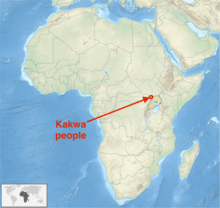Kakwa people
| Regions with significant populations | |
|---|---|
|
| |
| Languages | |
| Kakwa (Nilo Saharan) | |
| Religion | |
| Islam |

The Kakwa people are a Muslim ethnic group found in northwestern Uganda, south western South Sudan, and northeastern Democratic Republic of the Congo, particularly to the west of the White Nile river.[1]
The Kakwa people are a small minority but a part of the larger Karo people (East Africa), an intermarried group that also includes the Bari, Pojulu, Mundari, Kuku and Nyangwara. Their language, Kutuk na Kakwa, is an Eastern Nilotic language.[2]
According to the Kakwa oral tradition, they migrated out of East Africa (Nubian region) from the city Kawa in between the third and fourth cataracts of the Nile. First into South Sudan, and from there southwards into Uganda and the Democratic Republic of the Congo.[1] The Kakwa converted to Islam, accepting the Maliki school of Sunni theology in medieval era. They were annexed into Equitoria region claimed by the Egyptian Islamic ruler Khedive Ismail (Isma'il Pasha) by his descendant Tewfik Pasha in 1889. As the British colonial empire expanded into East Africa and Egypt, the region with Kakwa people became a part of the Uganda Protectorate.[1]
%2C_R23930288.jpg)
The Kakwa people rose to international prominence when one of their descendant General Idi Amin assumed the power in Uganda through a coup.[3] He filled important military and civil positions in his administration with his ethnic group,[3][4][5] and Nubians.[6] He arrested and killed officials from other ethnic groups such as the Acholi and Lango people, whom he doubted.[1] Idi Amin also supplied arms and financed the Sudanese Kakwa people in the first civil war of Sudan.[7] The Kakwa officials in Idi Amin regime were later accused of many humanitarian crimes. After Amin was deposed in 1979, many Kakwa people were killed in revenge killings, causing others to leave the area and fled to Sudan.[1] However, they have now returned to their native areas in the West Nile region of northern Uganda.[8]
The major cities of the Kakwa people are the Yei and Morobo districts (Republic of South Sudan), Koboko district (Uganda), Imgbokolo and Aba (Congo). The Kakwa people some times refer to themselves as "Kakwa Saliya Musala", translated directly as "kakwa three hills" a phrase they commonly use to denote their 'oneness' in spite of being politically dispersed among three countries.
The traditional Kakwa livelihood has been based on cultivating corn, millet, cassava, fishing and cattle. The traditional villages of Kakwa are linked by their lineage, with male forming councils of elders. Polygyny is accepted, and the Islamic traditions are a part of the Kakwa people lives.[1]
References
- 1 2 3 4 5 6 Anthony Appiah; Henry Louis Gates (2010). Encyclopedia of Africa. Oxford University Press. p. 629. ISBN 978-0-19-533770-9.
- ↑ Kakwa languages, Ethnologue
- 1 2 Kefa M. Otiso (2006). Culture and Customs of Uganda. Greenwood. pp. 31–33. ISBN 978-0-313-33148-0.
- ↑ Thabani ka Sigogo Sibanda (2011). Conflict Issues Across Disciplines: Conflict, Negotiation, and Mediation: African Experiences. Xlibris. pp. 67–68. ISBN 978-1-4568-1761-9.
- ↑ Phares Mukasa Mutibwa (1992). Uganda Since Independence: A Story of Unfulfilled Hopes. Africa World Press. pp. 79–81. ISBN 978-0-86543-357-1.
- ↑ Donald L. Horowitz (2001). Ethnic Groups in Conflict, Updated Edition With a New Preface. University of California Press. pp. 491–492. ISBN 978-0-520-92631-8.
- ↑ Donald L. Horowitz (2001). Ethnic Groups in Conflict, Updated Edition With a New Preface. University of California Press. pp. 274–281. ISBN 978-0-520-92631-8.
- ↑ The Republic of Uganda, Encyclopedia Britannica